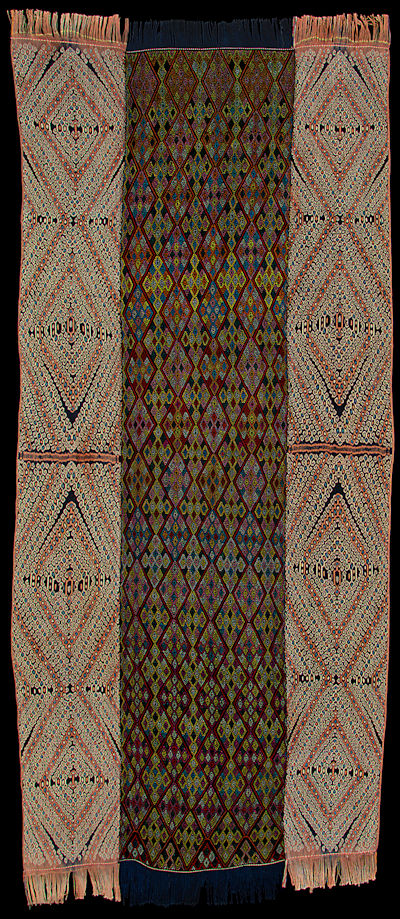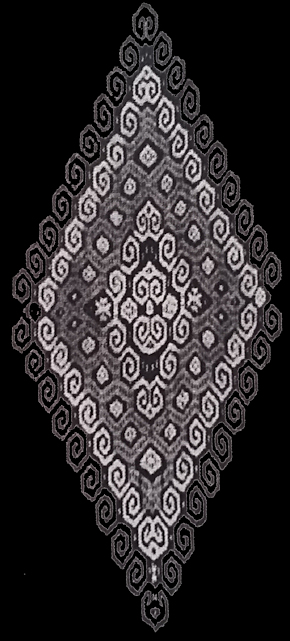| |
 
 | | | |
297 Timor, West Timor
Mau naek (men's wrap)  
| | Locale: | Molo, else probably Amanuban Barat, more specifically Nusa, where such large motifs were more common than elsewhere in the region. | | Period: | ca. 1950 | | Yarn: | Cotton, commercial, fine, quad-ply | | Technique: | Warp ikat | | Panels: | 3 | | Size: | 81 x 194 cm (2' 7" x 6' 4") LW: 2.40 | | Weight: | 585 g (20.6 oz), 372 g/m2 (1.22 oz/ft2) | | Design: | The ikated side panels have been decorated with four large kaif patterns in white, pink, black and light blue that merge into one another, connected by strings of hooks. The kaif pattern, the most commonly used motif on Timor, also seen on some islands to the east, stands for connection to the ancestors. The central panel is decorated in buna, a warp wrapping technique that is a Timorese hallmark, often found on fine textiles - alone or, as here, to enrich an ikat. The buna work consists of an array of diamond shaped lozenges that each consist of sixteen smaller lozenges, likely schematic representations of the kaif motif. The buna was done in fuchsia, yellow, brown, green, pink and white. Note that large men's wraps are called beti naek in Mollo, mau naik in Amanuban, the cloth's alternative origin. | | Comment: | The origin of this cloth is a bit of a mystery. It came with Molo provenance (along with its sister piece PC 296), but most would attribute it to Amanuban. Given the high quality of the buna, this must have been woven by a woman of royal descent for a special ceremony. Buna, discontinuous supplementary weft, is a labour intensive warp wrapping technique that produces no 'bad side': because the ends of the wrapped yarn are cleverly hidden, both sides are equally beautiful. It is used on its own, but also often in combination with ikat. Chemical dyes. [Note that the fringes of the central panel had to be copied from another cloth. The actual fringes are jet black and could not be visually separated from the background.] Ex collection August Flick. | | Background: | Chapters on Timor and West Timor. | | Exhibited: | Timor: Totems and Tokens, Museu do Oriente, Lisbon, 2019/20. | | Published: | Timor: Totems and Tokens, 2019.
Ikat Textiles of Timor: Indonesian and Timor-Leste, 2025. | | Compare: | 296 | | Sources: | The combination of ikat and buna is similar to that on a sarong shown in Hamilton and Barrkman, Textiles of Timor, Fig. 2.28. Similar patterning on Amanuban or Miomafo cloth in Khan Majlis, Woven Messages, fig. 254, though with the techniques in reversed position. Timor expert Pierre Dugard's extensive, as yet largely unpublished, documentation of Timorese designs includes the below drawing of a motif that many would attribute to Amanuban, but that was recorded in Konbaki, southern Molo.
 | | |

©Peter ten Hoopen, 2025
All rights reserved.
|
|


